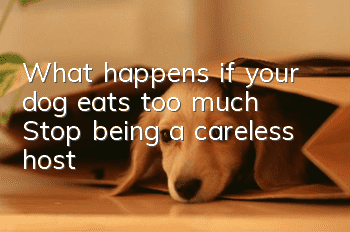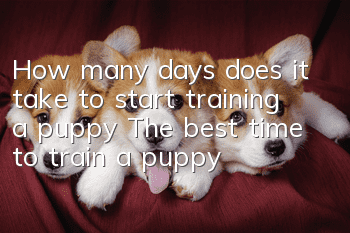What happens if your dog eats too much? Stop being a careless host

Vomiting
Dogs eat too quickly or too much when eating. The grain particles are not chewed fully and enter the digestive tract. This can easily stimulate the upper gastrointestinal tract and make the dog feel uncomfortable and vomit the food. come out.
Judgment: Relatively complete particles and saliva of dogs can be seen in the vomitus. This kind of physiological vomiting generally does not have a great impact on dogs. The dog will continue to eat after a short rest and its appetite will not be affected. Pet owners do not need to worry too much.
Recommendation: If the dog has the above-mentioned physiological vomiting, it is recommended that the pet owner choose a slow-feeding bowl or feed small amounts multiple times to slow down the dog's eating speed.
Most common in Labradors, French bulldogs, English bulldogs and other snack foodies who can't stop eating.
Indigestion
If the dog often eats too much (large types of food and large amounts of food), it is easy to cause indigestion in the dog. The intestinal tract of dogs is relatively shorter than that of humans, and the types and quantities of intestinal flora are far less than that of humans. Therefore, dogs’ food digestion time is shorter than that of humans (the time for gastric emptying after eating) About 7-10 hours), and cannot adapt to rapid food changes.
Indigestion in dogs may cause soft and smelly stools in dogs. In severe cases, it may cause gastritis and other digestive tract diseases.
Note: Vomiting is also a symptom of gastritis, but vomitus often contains blood, pus or floc. After drinking a lot of water, vomiting will be aggravated. It is also accompanied by symptoms such as loss of appetite, poor mental status, elevated body temperature, and increased desire to drink. Pet owners need to pay attention to the distinction and take the dog to the doctor in time.
Obesity
There are many reasons for dog obesity, such as breed reasons; limited activity venues and relatively little exercise; diseases: overfeeding, etc.
Dogs are very likely to become obese if they overeat for a long time.
Obese dogs are more susceptible to joint wear, heart disease, respiratory problems, blood pressure, immune function and other problems. For short-legged dogs such as Dachshunds, Pekingese dogs, and Japanese puppies, obesity also increases the burden on their lumbar spine and back, increasing the incidence of intervertebral disc disease.
Gastric dilatation-gastric volvulus
Gastric dilatation-gastric volvulus (GDV) is an acute disease that can be fatal. If the treatment is not timely, the dog may die within 1-3 hours, with a mortality rate of up to 100%; even if the treatment is timely, the mortality rate is still 15%-60%.
To put it simply, gastric dilatation-gastric volvulus is like a knot in the stomach, which causes the gas originally in the stomach to accumulate rapidly and prevents blood from flowing normally, causing ischemia and damage to other internal organs. In severe cases, necrosis, eventually leading to death from shock. Gastric dilatation will occur soon after gastric volvulus, which is more common in large dogs over 2 years old and dogs with deep and narrow chest cavities.
Keywords for high-incidence group: one shotOvereating, eating quickly; drinking a lot of water after eating; dogs being emotionally unstable, restless, anxious or nervous; engaging in strenuous exercise immediately after eating.
Preventive measures:a. Feed regularly and quantitatively
b. Use a slow-feeding bowl to slow down the dog’s eating speed
c. Do not let the dog engage in strenuous exercise such as running or jumping for one hour after feeding
/>d. Choose pet food with high energy density and easy digestion and absorption.
- British bulldog training tips, the process is so cute!
- Dog rhinitis symptoms
- Alaskan kennel training, a must-read for novices in dog training!
- Can a corgi be trained to stand?
- What are the coat colors of Australian Shepherds?
- Why do cats shed hair like crazy in spring? How should poop collectors deal with it?
- How to choose a purebred dog? Purebred Dog Buying Guide (Latest Edition)
- Dogs devour food without chewing it, which can lead to disaster
- How to choose the right leash for your dog?
- How to train your dog to understand the verbal command "sit"



